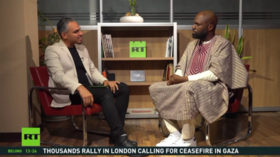West sees BRICS expansion as “direct threat” – analyst
The growing alliance is forcing neocolonial powers to rethink their “parasitic” relationship with the Global South, Jackie Shandu told RT
The West views the expansion of BRICS as an existential threat because a larger alliance jeopardizes the West’s “parasitic” relationship with the Global South, independent analyst Jackie Shandu told RT on Sunday.
Cooperation between BRICS and the EU, as proposed earlier this week by South Africa’s chief representative to the EU, Tokozile Xasa, means “the West will no longer be able to enjoy all the wealth and riches that it does directly at the expense of the rest of the world,” Shandu said.
Because exploiting weaker countries has “kept the West in this position of being highly industrialized, high-income, and very wealthy economies and nations,” the expansion of BRICS, which has allowed the developing world, particularly Africa, to hold its own on the global stage, “poses a direct threat to that very parasitic relationship,” he explained.
BRICS envisions itself as a competitor to “the current western-dominated global economic order and the military industrial complex,” which provides that order with a “monopoly on being able to mete out brute force,” Shandu continued.
“A more organized BRICS takes more than half the world away from the undemocratic dictatorship of institutions such as the IMF [and] the World Bank” and makes the UN Security Council more democratic, he said.
While he argued that this reality was gradually dawning on Europe, the South Africa-based analyst also observed that there was no “consensus” about next steps.
“It’s going to be a battle between the forces of light and darkness,” he said. “The forces of darkness will say, ‘well, we enjoy the undue privileges we maintain at the expense of equitable relations with the rest of the world!’”
South Africa’s envoy in Brussels stressed on Thursday that BRICS was “not an anti-Western coalition, as most would like to believe,” praising the alliance for “rais[ing] the voice of the South” as she called for agricultural cooperation between the EU and BRICS.
Such geopolitical agency directly conflicts with the West’s view of Africa as merely “a source of cheap labor, a source of cheap and stolen resources, and a lucrative market for luxury value-added goods manufactured in the Global North,” Shandu told RT.
BRICS+ includes Egypt, Iran, UAE, Saudi Arabia and Ethiopia in addition to the founding members, comprising nearly 30% of global GDP and 47% of the population, Xasa told MEPs at a conference titled Rising Power of BRICS: Implications for the European Union.
MEP Marcel de Graaff of the Netherlands urged his colleagues not to forget the EU’s dependence on BRICS, chiding the West for plundering the resources of the developing world while “bringing basically nothing in return.” Instead of lecturing the alliance’s members on human rights, the EU must “start with the economy and start respecting the autonomy of other countries,” he said.






Comments are closed.